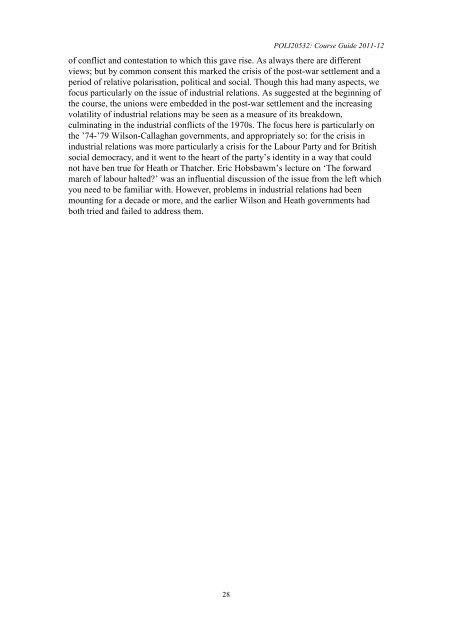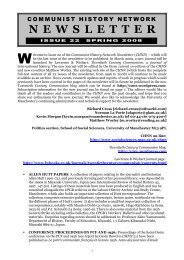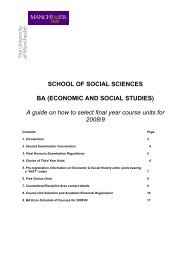POLI20532 Course Outline 1112 - School of Social Sciences
POLI20532 Course Outline 1112 - School of Social Sciences
POLI20532 Course Outline 1112 - School of Social Sciences
Create successful ePaper yourself
Turn your PDF publications into a flip-book with our unique Google optimized e-Paper software.
<strong>POLI20532</strong>: <strong>Course</strong> Guide 2011-12<br />
<strong>of</strong> conflict and contestation to which this gave rise. As always there are different<br />
views; but by common consent this marked the crisis <strong>of</strong> the post-war settlement and a<br />
period <strong>of</strong> relative polarisation, political and social. Though this had many aspects, we<br />
focus particularly on the issue <strong>of</strong> industrial relations. As suggested at the beginning <strong>of</strong><br />
the course, the unions were embedded in the post-war settlement and the increasing<br />
volatility <strong>of</strong> industrial relations may be seen as a measure <strong>of</strong> its breakdown,<br />
culminating in the industrial conflicts <strong>of</strong> the 1970s. The focus here is particularly on<br />
the ’74-’79 Wilson-Callaghan governments, and appropriately so: for the crisis in<br />
industrial relations was more particularly a crisis for the Labour Party and for British<br />
social democracy, and it went to the heart <strong>of</strong> the party’s identity in a way that could<br />
not have ben true for Heath or Thatcher. Eric Hobsbawm’s lecture on ‘The forward<br />
march <strong>of</strong> labour halted?’ was an influential discussion <strong>of</strong> the issue from the left which<br />
you need to be familiar with. However, problems in industrial relations had been<br />
mounting for a decade or more, and the earlier Wilson and Heath governments had<br />
both tried and failed to address them.<br />
28
















